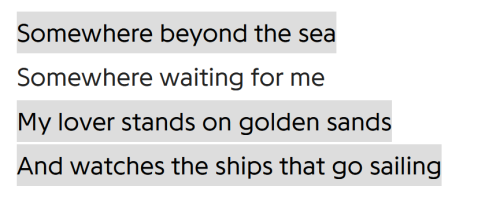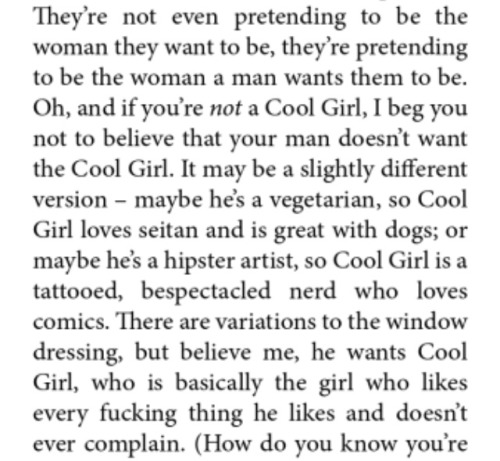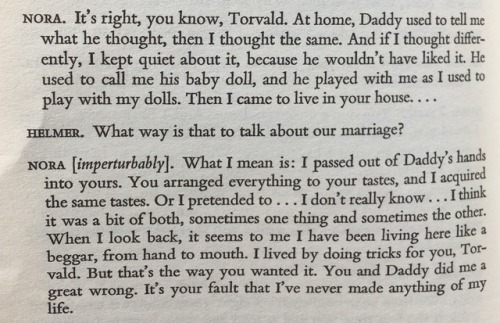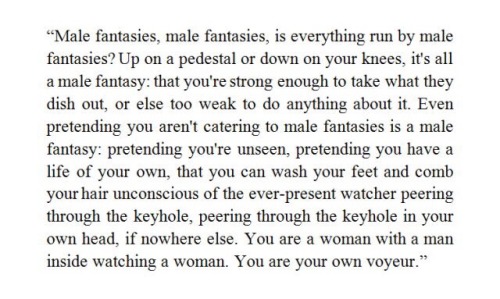“Ladies. Has It Ever Occurred To You That Fairy Tales Aren’t Easy On The Feet? […] No, Really,
“Ladies. Has it ever occurred to you that fairy tales aren’t easy on the feet? […] No, really, think about it. Think about the little mermaid, who traded in her tail for love, got two legs and two feet, and every step was like walking on knives. And where did it get her? That’s a rhetorical question, of course. Then there’s the girl who put on the beautiful red dancing shoes. The woodsman had to chop her feet off with an axe. There are Cinderella’s two stepsisters, who cut off their own toes, and Snow White’s stepmother, who danced to death in red-hot iron slippers. […] There was this one woman who walked east of the sun and then west of the moon, looking for her lover, who had left her because she spilled tallow on his nightshirt. She wore out at least one pair of perfectly good iron shoes before she found him. Take our word for it, he wasn’t worth it. What do you think happened when she forgot to put the fabric softener in the dryer? Laundry is hard, travel is harder.”
— Kelly Link, from “Travels with the Snow Queen”, Stranger Things Happen
More Posts from Purposefullylackadaisical and Others
“How as a girl, in cut-off jeans and a skimpy string-bikini top, I lay in the back of a pick-up truck, the better to bronze my young, bare flesh. How I wanted to scorch myself, then; how I wanted to burn my beauty onto the very eye of love. How lovely, the way we wreck ourselves on the world; how we shine in it, too.”
— Cecilia Woloch, ‘Girl in a Truck, Kentucky Highway 245’, in Narcissus (via antigonies)











Untitled painting by Daniel F. Gerhartz/ excerpts from 'Text me when you get home' by Kayleen Schaefer/ 'Hinds feet' by Daniel F. Gerhartz

The Madwoman in the Attic: The Woman Writer and the Nineteenth-Century Literary Imagination, Sandra Gilbert and Susan Gubar
can you do a web weaving about ocean/sea being metaphors for love?

William Shakespeare, Romeo and Juliet

SEAY, Love Is The Ocean

Zora Neale Hurston, Their Eyes Were Watching God

Edmund Dulac, ‘The Little Mermaid Saved The Prince’, from The Little Mermaid by Hans Christian Andersen

Titanic (1997) dir. James Cameron

Bobby Darin, Beyond The Sea

Nikos Kazantzakis in a letter to Harilaos Stefanidis, written c. June 1924

Kahlil Gibran, The Prophet

Uncle Yanco (1967) dir. Agnes Varda

Veronica Rossi, Through the Ever Night

The Kooks, Seaside

Vincent van Gogh, from The Letters of Vincent van Gogh
hi! i'm not sure if you already did this, but could you do a web weaving about the eldest daughter/ child (as a parental figure, taking care of younger siblings, etc.), but it doesn't have to be specifically about those things. thanks :)

@thisisalovestry (x)

Holly Warburton, Sisters

Maya Angelou, Mom & Me & Mom

Taylor Swift, tolerate it

Tabitha Suzama, Forbidden

@ch3r1b0mb (x)

Becks_Rylnn, How the Light Gets In




Supernatural (2005–2020), 1x18: Something Wicked

@thrill-of-first-lovee (x)

Daughter, Smother

Suzanne Collins, The Hunger Games

When Older Siblings Step Into Parents’ Shoes, NPR



a short collection on catering to men. Gone Girl by Gillian Flynn (2012) A Doll’s House by Henrik Ibsen (1879) The Robber Bride by Margaret Atwood (1993)









They lived and laughed and loved and left.
Joanne Harris // Cecelia Ahern // Illustration by Cecile Richard // Rupi Kaur // Margarita Karapanou // Miranda July // Taylor Swift // T. R. Hummer // Richard Siken // James Joyce


what do you think drives lady macbeth's cruelty and do you sympathise with her at all?
This post and this post might be of interest. But I think ‘cruelty’ is the wrong word. Cruelty implies violence for the sake of violence and enjoyment of violence. (See here.) Lady M doesn’t revel in the violence. She doesn’t delight in it the way some of the characters in, say, Titus Andronicus do, or even Margaret in Henry VI does after the murder of Rutland/during the murder of York. For Lady M violence is always a means to an end. “Infirm of purpose” is what she calls her husband when he starts to get faint-hearted. He’s too full of the milk of human kindness “to catch the nearest way.” For her, it’s all about the outcome. The ends justify the means. Like I said in one of those posts, I think her driving force is ambition. She wants more than what she has.
Interestingly, she never expresses any personal desire to be queen. She does, however, use the singular possessive pronoun ‘my’ when she says “The raven himself is hoarse / That croaks the fatal entrance of Duncan / Under my battlements.” She claims the crime as her own, and even though the idea of murder occurs to her and her husband independently, she is the criminal mastermind. She says, “you shall put / This night’s great business into my dispatch; / Which shall to all our nights and days to come / Give solely sovereign sway and masterdom.” And at the end of the scene: “Leave all the rest to me.” This regicide is her baby–and I use that word very deliberately. There are a million possible explanations for why Lady Macbeth is so desperate to seize this power for her husband. My guess is it has something to do with that baby she mentions in 1.7 which doesn’t appear in the play. A woman’s function at this point in history was basically to be a baby-making machine and ensure the survival of her husband’s line. She hasn’t been able to do that (for whatever reason) and her husband, at least, is already middle-aged, so that procreation window is rapidly closing, if it’s not closed already. By early modern standards, that’s a huge dynastic failure. My guess is that her power-grabbing is about agency and compensation. Maybe she can’t continue Macbeth’s line, but she can make him king. And she does.
But here’s the other part of it which I think is really important and often gets overlooked, and it goes back to the fact that Lady M never expresses a personal desire to be queen. She wants her husband to be king, and she thinks he is fully deserving of that office. “Thou wouldst be great;” she says, “Art not without ambition, but without / The illness should attend it.” AND THIS IS SO KEY. Because Lady M is nothing if not full of ambition. What she’s saying here is “You don’t have enough darkness in your soul to do this, so I’m going to do it for you.” Now. Is that somewhat fucked up? Absolutely. However, that is an enormous sacrifice to make. I’m not going to get into this in depth, but there’s a lot of natural law theory floating around in this play. What’s important to know is this: In the protestant ethos of this play, if you commit regicide, you are 100% going to be damned for eternity. There’s no doubt about that. So, in an insane backwards way, this is actually an incredibly loving, selfless thing to do on Lady M’s part. She is willing to sacrifice her own salvation to make her husband king. Let that sink in. That is so much more hardcore than just saying, “I’d take a bullet for you, babe.” She is willing to burn for all time to put him on the throne, and not only is she willing, but it’s her idea, not just something she does with her back against the wall. That is a crazy kind of love. And that’s one of my favorite things about this play. This is not a unanimous opinion by any means, but I firmly believe that even though the Macbeths are terrible tyrannical people, they are desperately, devotedly in love with one another. Their language is incredibly intimate. In his first letter Macbeth addresses his wife as “My dearest partner of greatness,” and throughout the play they are constantly struggling to help and heal one another. Theirs is a relationship built on love and equality, whatever else they do (and however their relationship is also sometimes toxic and fractures through the play). Look at Macbeth’s conversation with the doctor in 5.3 when his wife’s health begins to fail: “If thou couldst, doctor, cast / The water of my land, find her disease, / And purge it to a sound and pristine health, / I would applaud thee to the very echo, / That should applaud again.” That. Is. Love.
So. Why does Lady Macbeth do the terrible things she does? There’s no certain answer. Ambition has a lot to do with it. But I think that ambition is rooted in guilt about what she hasn’t been able to provide her husband with, and a passionate yearning to make up for that, somehow. Leo’s character says in Inception that positive emotion trumps negative emotion every time, and I think that’s true here. Lady M doesn’t orchestrate Duncan’s murder because she’s inherently cruel. She does it for love.
-
 purposefullylackadaisical reblogged this · 1 year ago
purposefullylackadaisical reblogged this · 1 year ago -
 oxfordsonnets liked this · 1 year ago
oxfordsonnets liked this · 1 year ago -
 pastel-twilights liked this · 2 years ago
pastel-twilights liked this · 2 years ago -
 sugarshiccup-a liked this · 2 years ago
sugarshiccup-a liked this · 2 years ago -
 keylimelye liked this · 2 years ago
keylimelye liked this · 2 years ago -
 marystaceylala liked this · 2 years ago
marystaceylala liked this · 2 years ago -
 barbieland liked this · 3 years ago
barbieland liked this · 3 years ago -
 prudencehalliwell reblogged this · 4 years ago
prudencehalliwell reblogged this · 4 years ago -
 kitchen-light reblogged this · 4 years ago
kitchen-light reblogged this · 4 years ago -
 cruelfeast reblogged this · 4 years ago
cruelfeast reblogged this · 4 years ago -
 folkheroine liked this · 4 years ago
folkheroine liked this · 4 years ago -
 nanamikentcs reblogged this · 4 years ago
nanamikentcs reblogged this · 4 years ago -
 rachelzegler reblogged this · 4 years ago
rachelzegler reblogged this · 4 years ago -
 langlee reblogged this · 4 years ago
langlee reblogged this · 4 years ago -
 doll-asylum reblogged this · 5 years ago
doll-asylum reblogged this · 5 years ago -
 hechiceria liked this · 5 years ago
hechiceria liked this · 5 years ago -
 zetar liked this · 5 years ago
zetar liked this · 5 years ago -
 clutterhearted reblogged this · 5 years ago
clutterhearted reblogged this · 5 years ago -
 springwolves liked this · 5 years ago
springwolves liked this · 5 years ago -
 changelingbaby liked this · 5 years ago
changelingbaby liked this · 5 years ago -
 deuterotic liked this · 5 years ago
deuterotic liked this · 5 years ago -
 flowerfacedowl reblogged this · 5 years ago
flowerfacedowl reblogged this · 5 years ago -
 sparklylettuce liked this · 5 years ago
sparklylettuce liked this · 5 years ago -
 badwolfdescending reblogged this · 5 years ago
badwolfdescending reblogged this · 5 years ago -
 ravennboys liked this · 5 years ago
ravennboys liked this · 5 years ago -
 bunsofbread liked this · 5 years ago
bunsofbread liked this · 5 years ago -
 persephoneslaugh reblogged this · 5 years ago
persephoneslaugh reblogged this · 5 years ago -
 noearthmoon liked this · 5 years ago
noearthmoon liked this · 5 years ago -
 babyvoidangeltree-blog liked this · 5 years ago
babyvoidangeltree-blog liked this · 5 years ago
95 posts